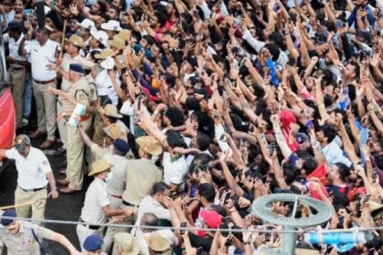
(Image source from: twitter.com)
Classic scientific texts of India will be taught in Sanskrit starting with Bhaskaracharya’s mathematical treatise.
More than 750 people have signed for a course that is being taught by IIT Indore in Sanskrit. The course has started on August 22. The first edition of this course will end on October 2.
IIT Indore has introduced an unprecedented course that will empower people with the scientific knowledge of religious texts. The course’s starting chapter will be about Bhaskaracharya’s mathematical treatise ‘Lilavati’ which dates back to 1000 years.
The entire course will be taught in the Sanskrit language. The institute has lined up with a 14 days program which will cover topics like metallurgy, astronomy, medicines and plant sciences.
Students can now study classical Indian scientific texts in their original language.
Professor Neelesh Kuma, who originated this program said that the Sanskrit language is finding its place in the Artificial Intelligence and will become the language of the future.
Teaching subjects in the Sanskrit language will become a necessity as it comes with a blend of technology.
Couse coordinator Ganti S. Murthy said that earlier the discussions on ancient scientific treatises which were originated in the Sanskrit language used to require a translator to make the language understand and in the process lot of nuances and the significant aspects were lost during the translations.
This program by IIT Indore will first help students to learn the language and converse in it after which they will be taken to the second phase where they can discuss the technical subjects in the language.
These students will be facilitated by experts from the language.
A qualifying exam will be conducted to evaluate the preparedness of participants in the language before they will be sent to the level 2.
Those students who are already well versed with the Sanskrit language and come from a technical background can directly proceed to the level 2 of the learning.
Participation of the students and discussions of the topics in the sanskrit language is mandatory and those who could not cope with or lose track will not be given the completion certificate.
30 percent of those who have enrolled in this course are working professionals. About 50 percent of them are undergraduate and masters students with Ph.D. scholars and others making up the rest of the count.
Most of the Indian scientific treatises in water resource management, agriculture, mathematics, metallurgy, astronomy, medicine, plant sciences and political texts are in the Sanskrit language.
Understanding the sanskrit language is extremely important to understand the concepts and to preserve the right information.
By Gayatri Yellayi





















